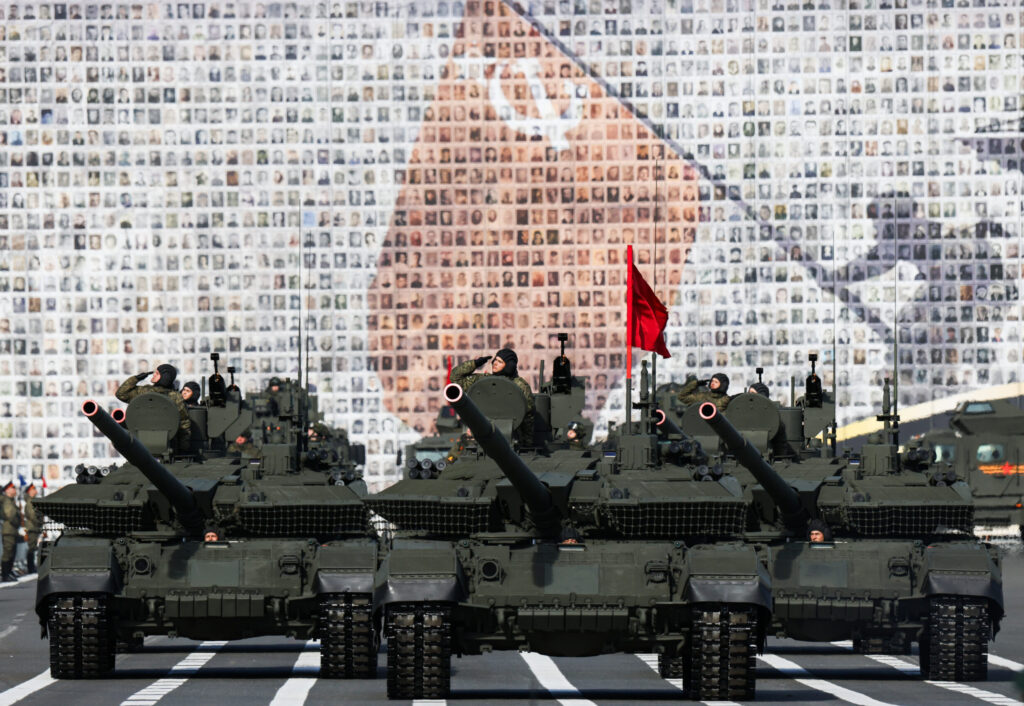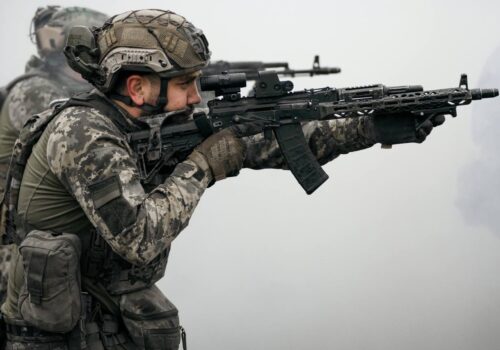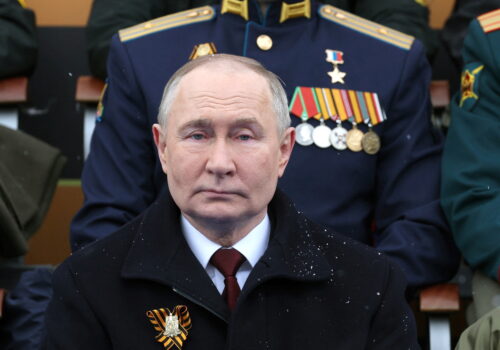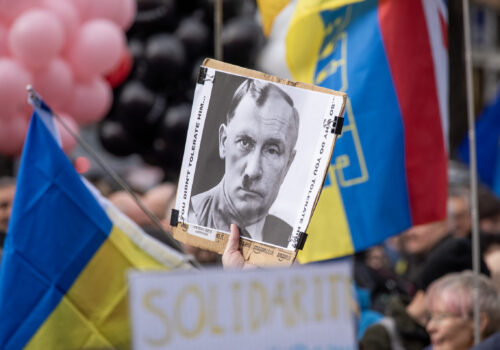Dozens of foreign leaders are expected in Moscow on May 9 for the largest international event in the Russian capital since Vladimir Putin launched the full-scale invasion of Ukraine more than three years ago. Officially, they are gathering for a military parade to mark eighty years since the World War II victory over Nazi Germany, but it is already apparent that the shadow of Russia’s current war in Ukraine will loom large over the entire spectacle.
The guest list for Friday’s Victory Day parade on Red Square reflects the dramatic geopolitical realignments that have taken place since 2022, and underlines the widening rift between Putin’s Russia and the democratic world. Prior to the invasion of Ukraine, Putin’s showpiece annual parade had been attended by many Western leaders including US President George W. Bush. This year, however, the guest of honor will be Chinese President Xi Jinping. He will be joined by the Brazilian president along with a host of Central Asian and African leaders. The sole representative from the European Union will be Slovakian Prime Minister Robert Fico.
Visiting dignitaries will be treated to a bold demonstration of modern Russia’s military might. The mood is expected to be far detached from the kind of somber tones more typically associated with World War II memorials elsewhere. Friday’s parade has been been carefully choreographed to emphasize Russian strength while projecting Putin’s supreme confidence in eventual victory over Ukraine.
The link to today’s war will be hammered home by the participation of numerous Russian military units accused of committing war crimes in Ukraine. Putin may also choose to surround himself with alleged war criminals from the ranks of his invading army, as he did last year. In his official address, it will be genuinely shocking if Putin does not attempt to draw direct parallels between the struggle against Nazi Germany and his own ongoing war in neighboring Ukraine.
Stay updated
As the world watches the Russian invasion of Ukraine unfold, UkraineAlert delivers the best Atlantic Council expert insight and analysis on Ukraine twice a week directly to your inbox.
Even without the involvement of Russian troops fresh from the front lines of the current war, it would be virtually impossible to separate Putin’s parade from the Kremlin propaganda justifying the invasion of Ukraine. Ever since Russia first set out to subjugate Ukraine more than ten years ago, the Kremlin has portrayed its escalating invasion as a continuation of the World War II fight against Germany, with Ukrainians cast in the role of modern-day successors to the Nazis. Despite an almost complete lack of evidence to support these absurd and obscene claims, the “Nazi Ukraine” narrative continues to resonate among a Russia population that has been utterly saturated in an extreme form of World War II mythology that often borders on religious fanaticism.
From the very first years of his reign, Putin has sought to place the Soviet Union’s World War II experience at the very heart of modern Russia’s national identity. For the Kremlin, this emphasis on the immense suffering and ultimate triumph of the Soviet war effort has served as the ideal ideological antidote to the horrors of Stalinism and the humiliations of the Soviet collapse. It has proved a highly effective strategy, helping to rebuild Russia’s battered national pride and giving new meaning to the country’s twentieth century totalitarian trauma.
Putin’s war cult has centered around Victory Day, which has emerged over the past 25 years as by far the most important holiday on the Russian calendar. Many outside observers assume Victory Day always enjoyed similar prominence, but that is not the case. In fact, Stalin himself discouraged commemorations and made May 9 a working day in 1947. It remained so until the mid-1960s, when Victory Day was declared a public holiday. Nevertheless, there was none of the pomp and fanfare currently associated with the anniversary of the Nazi surrender. In the 46 years between the end of World War II and the fall of the Soviet Union, Moscow hosted a grand total of just four Victory Day parades.
Eurasia Center events

Putin’s cynical exploitation of World War II has also shaped Russian rhetoric on the international stage. This has been most immediately apparent in relation to Ukraine, which Kremlin propaganda has consistently portrayed as a Nazi state. Russia’s lurid claims have proved remarkably resistant to reality, with even the 2019 election of Jewish candidate Volodymyr Zelenskyy as president of Ukraine failing to force a change in tactics. Instead, Putin and other leading Kremlin officials have resorted to ever more ridiculous mental gymnastics as they have struggled to explain how a supposedly Nazi country could elect a Jewish leader. In one particularly notorious incident during the first months of the invasion, Russian Foreign Minister Sergei Lavrov dismissed Zelenskyy’s Jewish roots by declaring that Adolf Hitler also had “Jewish blood.”
When Putin announced the full-scale invasion of Ukraine on the fateful morning of February 24, 2022, it came as no surprise that he identified “denazification” as one his two key war aims. The true meaning of this chilling phrase has since become abundantly clear; “denazification” is actually Kremlin code for “de-Ukrainianization,” and reflects Putin’s end goal of a Ukraine without Ukrainians.
In areas of Ukraine that have fallen under Kremlin control since the start of the invasion, the occupation authorities are systematically wiping out all traces of Ukrainian history, culture, and national identity. Thousands of children have been abducted and subjected to indoctrination in a bid to rob them of their Ukrainian nationality, while anyone seen as potentially loyal to Ukraine has been detained and dispatched to a vast network of prisons where torture is reportedly routine. Europe has not witnessed atrocities on this scale since World War II.
For decades, most European countries have marked the end of World War II with solemn memorial services while collectively vowing “never again.” Under Putin, Russians have come to embrace an altogether more menacing form of militant remembrance accompanied by the unofficial slogan “we can repeat it.”
Putin has already succeeded in weaponizing the memory of World War II to consolidate his grip on power, garner domestic support for his expansionist foreign policy, and dehumanize his enemies. He is now poised to use this week’s Victory Day parade in Moscow to legitimize the criminal invasion of Ukraine among his foreign guests and place it in the same context as the fight against Hitler. This is staggeringly disrespectful. It is also historically illiterate. If anyone today is guilty of echoing the crimes of the Nazis, it is Putin himself.
Peter Dickinson is editor of the Atlantic Council’s UkraineAlert service.
Further reading
The views expressed in UkraineAlert are solely those of the authors and do not necessarily reflect the views of the Atlantic Council, its staff, or its supporters.

The Eurasia Center’s mission is to enhance transatlantic cooperation in promoting stability, democratic values, and prosperity in Eurasia, from Eastern Europe and Turkey in the West to the Caucasus, Russia, and Central Asia in the East.
Follow us on social media
and support our work
Image: Artem Priakhin / SOPA Images via Reuters Connect





